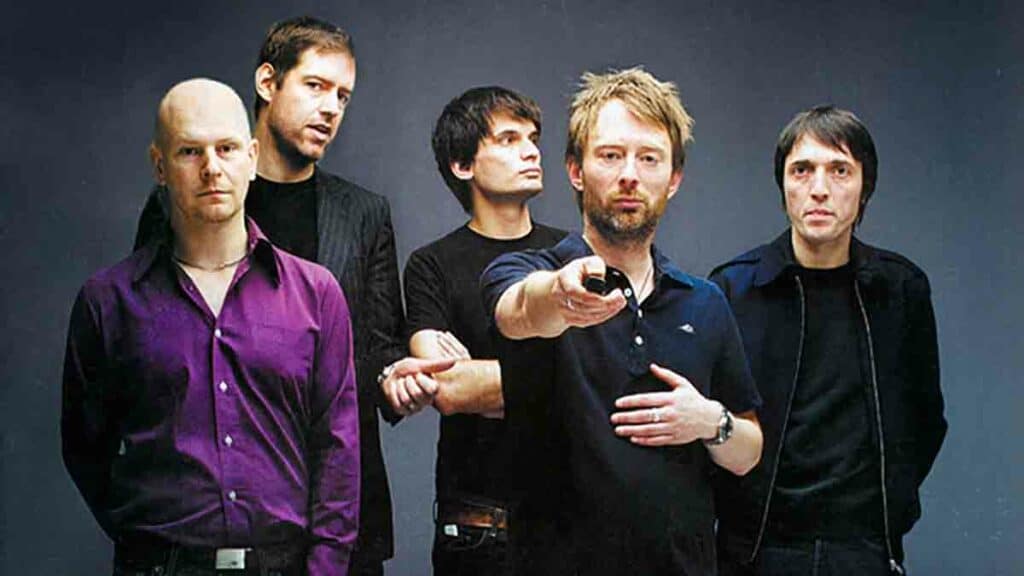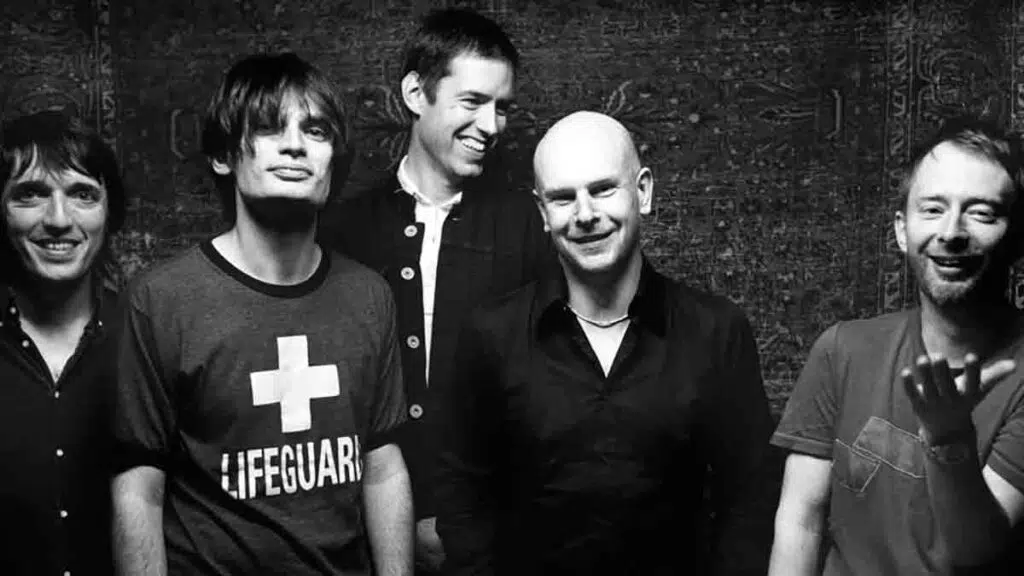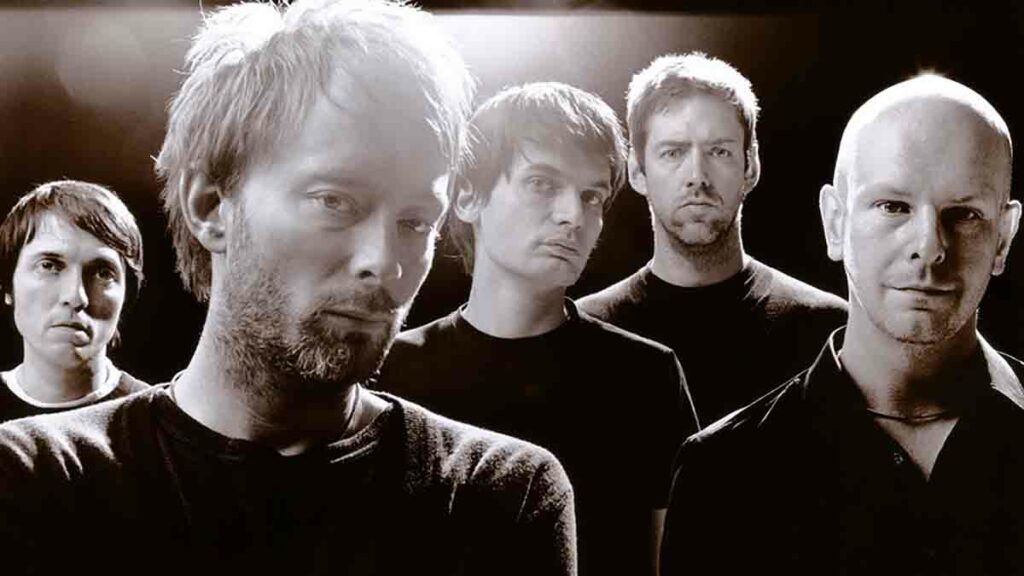At some point in the early 21st century, Radiohead became more than just a band: they became a foothold for all things fearless and adventurous in rock. They really inherited the throne from David Bowie, Pink Floyd и Talking Heads.
The latter group gave Radiohead their name, a track from their 1986 album True Stories. But Radiohead never sounded the same as Heads, and they didn't take much from Bowie other than his willingness to experiment.
Formation of the Radiohead collective
Each member of Radiohead was a student at the Oxfordshire Abingdon School. Ed O'Brien (guitar) and Phil Selway (drums) were seniors, followed by a year younger Thom Yorke (vocals, guitar, piano) and Colin Greenwood (bass).
The four musicians began playing in 1985 and soon added Colin's younger brother Johnny, who had previously played in Illiterate Hands with Yorke's brother Andy and Nigel Powell, to the band.
Johnny started playing keyboards but later switched to guitar. By 1987, all but Johnny had gone to university, where many of the students studied music, but it wasn't until 1991 that the quintet regrouped and began performing regularly at Oxford.

They eventually caught the attention of Chris Hufford - then known as the producer of Shoegaze Slowdive - who suggested that the band record a demo with his partner Bryce Edge. They soon became the band's managers.
Turning On a Friday into Radiohead
EMI got a little familiar with the band's demos, signing them to a contract in 1991 and suggesting they change their name. A band called On a Friday became Radiohead. Under the new name, they recorded their debut EP Drill with Hufford and The Edge, releasing the record in May 1992. The band then entered the studio with producers Paul Caldery and Sean Slade to record their full-length debut album.
The first fruit of these sessions was "Creep", a single released in the UK in September 1992. "Creep" didn't air anywhere at first. The British music weeklies ignored the tape, and the radio did not take it on the air.
The first glimpses of popularity
Pablo Honey, the band's full-length debut album, appeared in February 1993, backed by the "Anyone Can Play Guitar" single, but neither release gained much popularity in their native UK.
By this point, however, "Creep" had begun to catch the attention of listeners from other countries. At first, the song was a hit in Israel, but the big wave of attention came from the United States, which had experienced the alternative rock revolution.
Influential San Francisco radio station KITS has added "Creep" to their playlist. So the record spread along the west coast and on MTV, becoming a real hit. The song nearly topped number one on the Billboard Modern Rock chart and peaked at number 34 on the Hot 100.
We can say that this is a huge achievement for the British guitar group. The re-released "Creep" became a UK top ten hit, reaching number seven in the fall of 1993. The previously unsuccessful group suddenly has more fans than they could ever have expected.
Road to recognition for Radiohead
Radiohead continued to tour with Pablo Honey in 1994, but there were no subsequent hits, which led critics to doubt that they were a one-hit band. Such criticism weighed heavily on the band, who sought to record their new songs. They got that opportunity in early 1994 when they entered the studio to work with producer John Leckie – then best known for his work with the Stone Roses on the 1994 EP My Iron.
The strong and ambitious EP gave a good idea of what The Bends album would be like. Released in March 1995, The Bends showed that Radiohead were growing musically. The album was very melodic and experimental.

After that, critics in the UK accepted the group, and the public eventually followed suit: none of the first three singles ("High and Dry", "Fake Plastic Trees", "Just") did not rise above #17 in the UK charts, but the last single "Street Spirit (Fade Out)" reached number five at the end of 1996.
In the US, The Bends stalled at No. 88 on the Billboard charts, but the record gained popularity among listeners. And the band never stopped touring with this work, opening North American shows for REM in 1995 and Alanis Morissette in 1996.
Radiohead: Breakthrough of the Year
During 1995 and 1996 the band recorded new material with Nigel Godrich, the band's producer. The single "Lucky" appeared on the 1995 charity album "The Help Album", "Talk Show Host" appeared on the B-side, and "Exit Music (For a Film)" appeared as the soundtrack to Baz Luhrmann's "Romeo and Juliet".
The last single also appeared on OK Computer, the June 1997 album that was pivotal in Radiohead's career.
"Paranoid Android", an elegant work released as a single in May of that year, reached number three in the UK charts. It was the biggest hit to date in the UK.
A breakthrough is exactly what OK Computer turned out to be, a record that turned out to be key not only for Radiohead, but also for rock in the 90s. With rave reviews and corresponding strong sales, OK Computer closed the doors to Britpop hedonism and dark grunge motifs, opening a new path to sober, adventurous art rock where electronics coexisted with guitars.
Over the next few years, the band's influence would become apparent, but the album also had a significant impact on the band itself. The album debuted at number one in the UK and won a Grammy for Best Alternative Album. Radiohead supported him on an international tour documented in the film "Meeting People Is Easy".
Kid A and Amnesiac
By the time Meeting People Is Easy hit theaters, the band had begun work on their fourth album, once again teaming up with producer Godrich. The resulting album, Kid A, doubled down on OK Computer's experimentalism, embracing electronics and diving into jazz.
Released in October 2000, Kid A was one of the first major albums to be pirated through file sharing services, but these scams did not have a noticeable effect on the record's sales: the album debuted at number one in the UK and US.
Again, the album won Best Alternative Album at the Grammys, and although it did not release any hit singles (indeed, no singles were released from the album), it was certified platinum in several countries.
Amnesiac, a collection of new material that began during the Kid A sessions, appeared in June 2001, topping the UK charts and reaching number two in the US.
Two singles were known from the album - "Pyramid Song" and "Knives Out" - a signal that the album was more commercially available than its predecessor.
Hail to the Thief and break
At the end of the year, the band released I Might Be Wrong: Live Recordings, and by the summer of 2002 they turned their attention to recording a new album with Godrich. The resulting "Hail to the Thief" appeared in June 2003, again debuting at the top of the international charts - number one in the UK and number three in the US.
The band supported the album with live shows, culminating in the band's headlining performance at Coachella 2004, which coincided with the release of COM LAG b-sides and remixes. This recording helped secure a contract with EMI.
For the next few years, Radiohead were on sabbatical as individual members pursued solo projects. In 2006, Yorke released the purely electronic solo work The Eraser, and Jonny Greenwood began a career as a composer, starting with 2004's Bodysong, and then began a fruitful collaboration with Paul Thomas Anderson in 2007 for Will Will Be Blood. Greenwood would also work on Anderson's follow-up films, The Master and Inherent Vice.
New approach to sales
Several unsuccessful sessions with Spike Stent led the band to return to Godrich towards the end of 2006, finishing recording in June 2007. Still without a record label, they decided to release the album digitally through their official website, allowing users to pay any amount. This new strategy acted as the album's own promotion - most of the articles about the release of this work claimed that it was revolutionary.

The album received a physical release in the UK in December followed by a January 2008 US release. The record sold well, debuting at number one in the UK and winning a Grammy for Best Alternative Music Album.
Radiohead toured in support of In Rainbows in 2009, and during the tour, EMI released Radiohead: The Best Of in June 2008. The band went on hiatus again in 2010, allowing Yorke to form a band called Atoms for Peace with producer Godrich and Flea from the Red Hot Chili Peppers.
During this time, drummer Phil Selway released his debut solo album, Familial.
Album The King of Limbs
By early 2011, the band had completed work on a new album and, as with In Rainbows previously, Radiohead initially released The King of Limbs digitally via their website. Downloads appeared in February and physical copies appeared in March.
Radiohead's ninth album, A Moon Shaped Pool, was released on May 8, 2016, with the singles "Burn the Witch" and "Daydreaming" released earlier in the week. Radiohead supported A Moon Shaped Pool on an international tour and in June 2017 they celebrated the 20th anniversary of OK Computer with a two-disc re-release of the album titled OKNOTOK.
Thanks to many bonuses and previously unreleased material, version number two entered the UK charts and was backed by a major television performance at Glastonbury. Over the next year, Selway, York and Greenwood released film soundtracks, and the latter received an Oscar nomination for his score in Phantom Thread.



